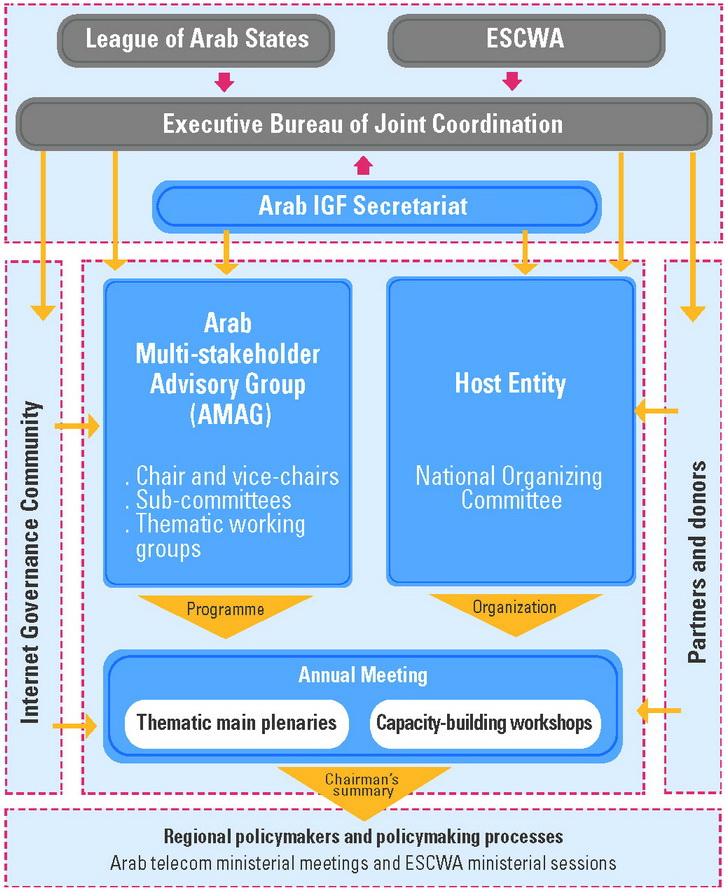Arab Internet Governance Forum 2015
The Economic and Social Commission for Western Asia (ESCWA) and the League of Arab States held the Conference and Public Consultations to Establish the Arab Internet Governance Forum (Arab IGF) in Beirut, from 31 January to 1 February 2012, within their partnership and coordination framework regarding the Arab Dialogue on Internet Governance and efforts to implement the 2010 Arab Regional Roadmap for Internet Governance. Participants highlighted the need to establish the Forum and conduct consultations to identify its objectives and mechanisms.
The outcome document of the Conference was submitted to the meeting of the Executive Bureau of the Council of Arab Ministers of Telecommunications and Information at its thirtyfirst session (Beirut, 2 February 2012), which expressed its support for the establishment of the Forum. At its twenty-seventh session, held in Beirut from 7 to 10 May 2012, ESCWA voiced its determination to continue its efforts to establish the Forum in partnership with the League of Arab States, and adopted resolution 306 (XVII) in that regard.
Similar to the global Internet Governance Forum (IGF) launched by the United Nations Secretary-General in 2006, following the second phase of the World Summit on the Information Society (WSIS), held in Tunis from 16 to 18 November 2005, the Arab IGF brings together all stakeholders in the field of Internet policies, including Governments, the private sector, civil society, technical practitioners, the academic community and regional organizations. The Arab IGF offers a platform for these actors to engage in an open dialogue on international Internet-related public policy issues.
- Discuss policy issues related to Internet governance, in particular those raised within the global IGF, with a view to promoting access to the Internet and ensuring its security, stability and development.
- Facilitate the exchange of information, best practices, lessons learned and knowledge, particularly with experts in public policy, technology and academic matters; and disseminate the recommendations and proposals emanating from discussions held within the Arab IGF;
- Reach a common understanding of the priorities of Internet governance and mechanisms to respond to the specific needs of Arab countries;
- Discuss emerging technologies and make recommendations thereon;
- Contribute to capacity-building and development in the area of Internet governance in Arab countries; and promote the involvement of all stakeholders to fully utilize available knowledge and expertise;
- Disseminate the Arab perspective regarding Internet governance at the global level and support Arab stakeholders in the formulation of Internet governance policies, without assigning oversight functions to the Arab IGF or turning it into a substitute for existing mechanisms, institutions or organizations;
- Communicate with regional and international forums on Internet governance to facilitate experience sharing and knowledge transfer.
-
Access: Internet infrastructure and critical resources;
-
Policies: International and national Internet policies;
-
Security and privacy: Towards a reliable and secure infrastructure;
-
Openness: Rights and responsibilities;
-
Internet and young people: A culture of participation and development opportunities.
ESCWA and the League of Arab States serve as umbrella organizations for the Arab IGF, and the National Telecommunication Regulatory Authority (NTRA) of Egypt was designated as its secretariat.
In 2013, the Executive Bureau for the Joint Coordination of the Arab IGF was established, with ESCWA and the League of Arab States as leading agencies and the secretariat of the Arab IGF as member. The Bureau takes major decisions related to the overall Arab IGF process. In addition to identifying the roles of partners, it is tasked with establishing an Arab IGF multi-stakeholder advisory group and selecting the host party for the Forum’s annual meetings. The Bureau also coordinates between key partners, the host and the advisory group on the preparations for the Forum’s annual meetings. It promotes the broad involvement of stakeholders in Internet governance on the one hand, and formal communication with policymakers on the other hand, with a view to ensuring the sustainability and success of the Arab IGF process.
The Arab Multi-stakeholder Advisory Group (AMAG) comprises representatives of all stakeholders in the Arab region and undertakes a number of tasks, notably the identification of the technical themes to be addressed at the Forum’s annual meetings. The Group was first established in 2012 and restructured in 2014 to include 34 experts representing stakeholders. The 2015 Group was set in April. The application for membership of the AMAG was kept open to encourage government representatives to be more involved in the development of the Arab IGF process.
Preparations for the Forum meetings include identifying a hosting entity. The host is designated on an annual basis by the umbrella organizations, ESCWA and the League of Arab States,
Arab IGF Process

in coordination with the Arab IGF secretariat, during the meetings of the Executive Bureau of Joint Coordination.
- The First Annual Arab IGF meeting, attended by over 300 participants, was held in Kuwait and hosted by the Kuwait Information Technology Society, on the theme “A better Internet for a better Arab world” (9-11 October 2012);
- The Second Annual Arab IGF meeting, attended by some 800 participants, was held in Algiers and hosted by the Ministry of Post, Information and Telecommunications Technologies, on the theme “Partners for development” (1-3 October 2013);
- The Third Annual Arab IGF meeting (AIGF-III), attended by some 500 participants, was held in Beirut and hosted by ESCWA, on the theme “Arab perspective for shaping the future of the Internet”.